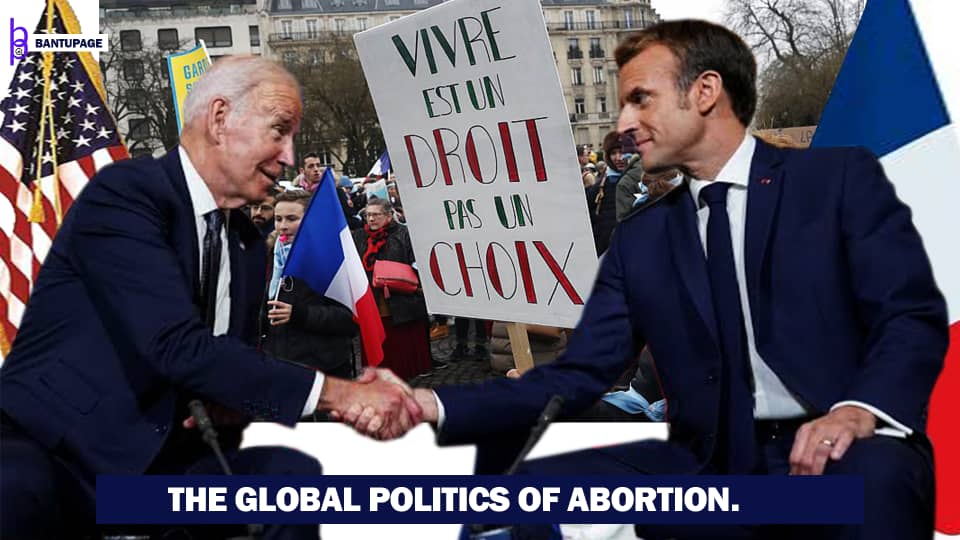
The Global Politics of Abortion.
The Eiffel Tower twinkled in celebration and lit up with the words “My Body, My Choice”, while abortion activists celebrated the news that France had legalised abortion,French lawmakers overwhelmingly approved the bill, with over 90% of them voting. 902 French lawmakers voted on the bill; 780 voted in favour, 72 voted against, and 50 abstained, which means this bill was passed with an overwhelming majority.
The women’s group also commemorated the momentous legislation. The United States’ decision to prohibit abortion rights two years ago did not prevent the European nation from legalising abortion. The change will be officially incorporated into the constitution during a public event on Friday, which coincides with International Women’s Day, in the heart of Paris.
Humans possess certain fundamental rights: the right to life, the right to education, the right to expression, and the right to religion. These are some of our fundamental rights, but here is the contentious one. The legal right to abortion. Abortion advocates argue that the right to abortion should be considered a fundamental for women, However, it is frequently a contentious issue. France has taken a significant step towards resolving this by enshrining abortion as a constitutional right, becoming the first country to do so.
President Macron hailed it as a source of national pride for France.The global unpopularity of abortion legislation is seen in France’s distinction as the first nation to fully legalise abortion. Abortion is prohibited in 24 nations, while in 37 countries, it is subject to stringent limitations. Hungary has enacted stricter abortion legislation; Latin America has implemented regressive anti-abortion laws; Africa has the highest mortality rate associated with unsafe abortions; and Laos and the Philippines have made it illegal. Despite these circumstances, France has been regarded as a prominent advocate for women’s rights, although this perception may be subject to debate.
The big question, however, is: Did France do this to protect women or is this another case of playing politics with women’s bodies?
In order to address that inquiry, it will be necessary to provide some historical context.
Abortion was legalised in France in 1975, with a gestational limit of 10 weeks. In 2001, this limit was increased to 12 weeks, and in 2022, it was further extended to 14 weeks. Additionally, the country’s health system provides coverage for the operation. This has been the situation since the 1980s. Surveys conducted in France indicated that a significant majority of 86% of French residents favour the right to abortion. This support was particularly strong among right-wing lawmakers, which explains the overwhelming backing it obtained in parliament.
Despite the French president’s pre-vote assertion that abortion rights were at risk, the facts indicated otherwise. Since 1975, the French abortion legislation has undergone nine revisions, each resulting in wider access. Both the public and parliamentarians have consistently shown support for these changes. It is crucial to acknowledge that the decision to include it into the constitution was a commendable action. However, the primary inquiry remains: what prompted them to do so at this particular moment? Primarily, it is politically advantageous.
President Macron, despite lacking a majority in the national assembly, successfully enacted laws regarding immigration and pension reforms, which were widely unpopular. The left criticised him for not going far enough, while the right deemed his efforts insufficient. However, the issue of abortion rights served as a significant political rallying point, garnering support from the majority of lawmakers. The bill significantly enhanced his popularity, albeit it had less tangible impact.
Prior to the present moment, the legality of abortion in France was already established, thus making it a recognised right. Consequently, there were no substantial changes on the matter, save for the position of Marcaron. This action enhances his legitimacy as the president who safeguarded the rights to abortion, leading us to the global politics around abortion. It serves as a political instrument.
Republican states in the US implemented bans on abortion to align with the preferences of their voter base. Joe Biden is advocating for it because of its significance to his Democratic constituents. Poland enacted a ban on it during the tenure of the right-wing government, and the current prime minister intends to reverse it due to its alignment with the preferences of his support base.
Women’s bodies are currently a subject of political struggle worldwide. Politicians do not view reproductive health as a matter of personal choice or entitlement, hence limiting women’s ability to make decisions regarding their own reproductive well-being.
The focus lies on these politicians and their self-interests. Countless women worldwide lack access to contraception or abortion rights, rendering France’s decision to incorporate abortion into the constitution just symbolic. While the issue of abortion holds personal significance for many women, it is necessary to acknowledge that it also carries political implications, similar to abortion rulings in other countries.
By Nnaemeka ODENIGBO.





